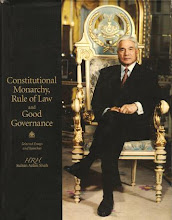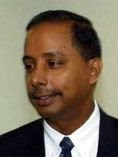An article on Parliamentary Reform in Malaysia
-by Kaneshwaran Govindasamy
The Malaysian Parliament has pulled through a stormy phase which resulted in the suspension of the opposition leader most recently. Consequently, a review of standing orders has been pursued by the speaker and parliamentary procedures may be tightened even more. These steps are being taken by the Malaysian government to preserve the image of parliament. Patterned after the parliament of the UK, the Malaysian parliament has been criticized for being too biased towards the ruling powers.
The Malaysian Parliament consists of Senate or Dewan Negara (70 seats; 44 appointed by paramount ruler, 26 elected by 13 state legislatures; to serve three-year terms with limit of two terms) and House of Representatives or Dewan Rakyat (222 seats; members elected by popular vote to serve five-year terms)
After the 12th General Elections concluded in March 2008, does the new Parliament have shown its capabilities in bringing about reforms? Uppermost in the minds of many Malaysians was whether our MPs and Parliament would stand up to uphold professionalism, modernization and democratization? The message that delivers the whole world of our MPs is their unmannerly behaviour in Parliament, with poor and unhealthy parliamentary conduct.
We all would agree that MPs should take necessary steps to ensure that the language used is more gender sensitive and that uncouth behaviour should not be tolerated in Parliament. At least I have felt that MPs who went against parliamentary rules should be fined if they refused to apologise for their indecent behaviour.
Malaysian TV viewers were shocked earlier this year when lawmakers insulted each other during the first televised parliamentary debate. In most recent weeks, the foul word threw to YB Kulasegaran by the ruling MP in the Parliament was ignored without respect and there were no serious actions taken, neither to suspend nor to demand for open apology from the Pasir Salak MP for against the parliamentary standing orders.T
unku Aziz in a recent forum in a private college in Kuala Lumpur said that there is no Ethical Code of Conduct for MPs currently in force in Malaysia in contrast to the UK. Though a Parliamentary Select Committee on Code of Ethics for MPs was formed during the term of the 11th Malaysian Parliament, it held only one meeting in June last year and hasn’t met since then. The 11th Malaysian Parliament therefore failed to deliver on putting in place a mechanism for the accountability of our MPs. MPs have to put public interest where it belongs – right at the centre of their agenda. They must concentrate on reinforcing ethical values and most importantly, practice what they preach.
The purpose of an ethical landscape in public life should be to ensure high standards of conduct – the fact that it will not necessarily increase public trust in politicians should not detract from this purpose, nor should it be a reason to abandon attempts to improve standards of conduct. It is also true that poor standard of conduct will further reduce public trust in politicians.
Education and guidance can play a part in developing the ethical landscape. MPs should be encouraged to be proactive and to see the regulation of standards of conduct not as a trap for the unwary, but as an important aspect of their position in public life. The aim of any system should be to foster a culture of compliance with the rules on standards and not just to punish the wrongdoer.
Datuk Shahrir Abdul Samad, Johor Baru MP and the Chairman of the Barisan Nasional Backbencher Club, believes that “if the re-introduction of integrity fails in the Parliament, it will fail elsewhere.” To succeed, there must be a clear distinction between the parliament and political parties. The need to reform Parliament is urgent as MPs in government fail to detach themselves from their party interests when in the Dewan Rakyat.
It is crucial to establish support structures to assist MPs in their legislative and oversight functions whereby this includes MPs being assigned research staff and legislative assistants, legal counsel for the Houses of Parliament and a Parliamentary Institute to train MPs in parliamentary law and procedures. Some of the suggestions are that draft copies of Bills to be supplied at least two weeks before the beginning of the session and important Bills to be committed to Select Committees of the Houses where members of the public could be heard during the committee stage.
Dato’ Param Cumaraswamy, President of Transparency International Malaysia, supported on parliamentary reform and stressed the need for leadership by example, as well as a strong political will and commitment to carry out the necessary reforms. In his view, there is an urgent need to restore integrity in politics and there must be a separation of personal and national interest. Since political parties have a code of conduct for members to adhere to, there should also be a code of conduct for elected representatives in the Parliament.
The way I see it, Reformation on the parliamentarian system is urgent. Regardless of whether parliament should sit for a whole year, reforms must be carried out immediately to ensure that MPs are given adequate opportunity to address issues of national importance together with the necessary support for them to perform professionally.
Dewan Rakyat Deputy Speaker Wan Junaidi Tuanku Jaafar proposed that parliament sit for a whole year to give MPs more time to debate and pass bills. This year, Parliament was originally scheduled to sit for 71 days although the recently concluded sitting was extended by two days. As a result of the political tsunami of March 8, the recent parliamentary sitting saw a big surge of interest in parliament. MPs from both sides of the divide are clearly more active in debates than ever in part because of the increased number of opposition members, but also as a result of the reduction in the number of Barisan Nasional frontbenchers from 91 to 68 members.
According to YB Liew Chin Tong, DAP Bukit Bendera, saying that more MPs will be fighting for their chance to speak (frontbenchers are only allowed to represent the government’s stance). Before we mull over the suggestion for an ‘all year long’ parliamentary sitting, Liew would like to offer three suggestions for the immediate reform of parliament, making it more relevant and therefore more efficient. First, the weekly meeting of party whips proposed by Minister in the PM’s Department Nazri Aziz should be implemented and institutionalized as soon as possible. No mature parliament runs its affair in a free-for- all style.
In a mature parliament, the government whip will negotiate with his counterpart in the opposition to set the parliament’s agenda. The whips then arrange MPs in their respective parties to participate in parliamentary debates in the most effective manner. Second, a system of parliamentary committees is needed. Again, no mature parliament conducts its affairs without a committee system to screen bills and monitor ministerial performance.
In fact, experts on parliamentary matters would generally agree that the real work of MPs is done within these committees. Third, a ‘second chamber’ a la Westminster Hall is worth considering. To accommodate the need for MPs to address the house, the Australian and British parliaments created a second chamber, called the ‘Main Committee’ and ‘Westminster Hall’ respectively. The second chamber is a smaller hall - chaired by deputy speakers or the speaker’s assistants - that allows MPs to speak and have their speeches recorded in the Hansard, as well as to be answered by ministers. The only caveat is that the second chamber does not pass laws. With weekly whips meetings, an effective committee system and an additional chamber in place, the Dewan Rakyat’s business will be conducted in a more efficient manner without jeopardising the MPs’ chances of representing the rakyat adequately.
In 2004, YB Kit Siang, DAP Ipoh Timur, had made 12 proposals for parliamentary reform and modernization for Malaysia to have a “First World Parliament” not only in infrastructure, but mindset, culture, practices and performance. These 12 proposals for First-World Parliament should be adopted as the parliamentary agenda of both the Barisan Nasional and the Opposition in the 12th Parliament when it convenes for its first meeting in May. The proposal included:
1. Live telecast of parliamentary proceedings.
2. Daily two-hour question time.
3. Prime Minister’s Question Time twice a week.
4. Opposition MP heading the Public Accounts Committee (PAC).
5. Some 30 specialist Parliamentary Select Committees with a Select Committee for every Ministry.
6. About ten general Parliamentary Select Committees to produce annual reports on progress, trends and recommendations on national integrity, IT, women’s agenda, environment, mass media, corruption, etc.
7. Allocation of certain days a week specifically to deal with Opposition business;research and constituency staffing for MPs.
8. An Opposition Deputy Speaker.
9. Modernization and democratization of Standing Orders.
10. Code of ethics for all MPs.
11. Ministers’ Parliamentary code of conduct.
The political tsunami of March 8, 2008 general election is an unmistakable mandate and demand for far-reaching changes in Malaysia after 50 years of nation-building, including the creation of a vibrant, vigorous and truly representative First-World Parliament.
The amendments to the Standing Orders should be the first step in the long-awaited parliamentary reform and modernization to pave the way for the Malaysian Parliament to become a First-World Parliament as part of the national efforts to create a “First- World Infrastructure, First-World Mentality” Malaysia.
I strongly suggest the present Malaysian Government to re-consider of the above mentioned suggestions and proposal in its effort in launching the campaign to improve the behaviour of its members of parliament and reforms in the parliament. The question of integrity is outmost crucial in expanding the role of parliament in global society.
However, I believe a panel of discussion shall need to be set up (by a mix of ruling and opposition MPs, educationist, political analyst and etc) as soon as possible provided a platform where various avenues were explored and discussed on the table. In summary, this panel shall need to conclude the moving forward commandments in strengthening the parliament and its supremacy as the representative body of the people.
by Kaneshwaran Govindasamy


























